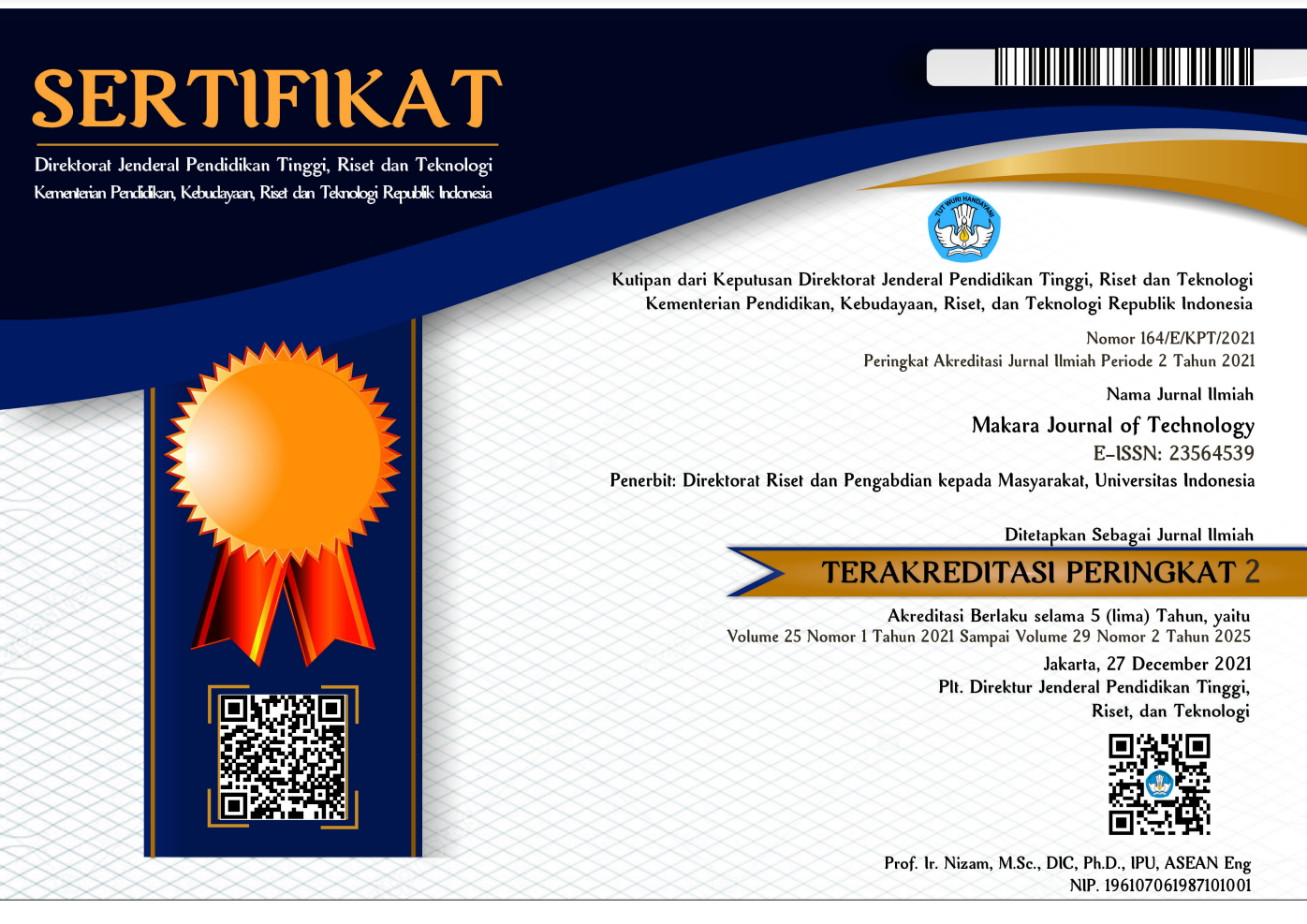Abstract
The Rankine cycle is an electricity generation system that uses water or organic fluids as high-grade or low-grade heat sources, respectively. In this paper, we present the results of our study of Rankine-cycle power generation in which we compared water and organic fluids (toluene and n-nonane) as working fluids in saturated and superheated states. We analyzed the energy and exergy of the Rankine cycle in a saturated vapor state at 300 °C and superheated states at 400 °C and 500 °C (the pressure remained the same as that at 300 °C), and assumed a constant heat input for all states. In the energy analysis, we determined the mass flow rate, heat rejection, work input of the pump, work generated by the turbine, net work output, and thermal efficiency. In the exergy analysis, we determined the exergy input, exergy loss, exergy destruction at the pump and the turbine, and the exergetic efficiency. The results show that water, categorized as a wet fluid, obtains a better performance with respect to both analyses in saturated and superheated states than toluene and n-nonane, which are categorized as isentropic and dry fluids, respectively. The water realizes a higher performance in the superheated than in the saturated state, whereas the performances of toluene and n-nonane are poorer in the superheated than in the saturated state.
Bahasa Abstract
Studi Perbandingan Pembangkit Daya Sistem Rankine Menggunakan Air dan Fluida Organik dalam Keadaan Jenuh dan Superpanas. Sistem Rankine adalah sistem yang digunakan untuk membangkitkan listrik. Air digunakan sebagai fluida kerja untuk sumber kalor tinggi, sedangkan fluida organik digunakan untuk sumber kalor rendah. Makalah ini membahas studi pembangkit listrik siklus Rankine dengan membandingkan air dan fluida organik (toluene dan n-npnane) sebagai fluida kerja pada tingkat keadaan uap jenuh dan superpanas. Studi ini menganalisis energi dan eksergi siklus Rankine dengan tingkat keadaan uap jenuh pada 300 °C dan superpanas pada 400 °C dan 500 °C (tekanan sama dengan 300 °C) sebagai data awal, dan panas yang masuk diasumsikan konstan untuk semua tingkat keadaan. Laju aliran massa, panas yang hilang, kerja pompa dan kerja turbin, kerja netto, dan efisiensi termal merupakan bagian dari analisis energi. Analisis eksergi dilakukan dengan menghitung eksergi masuk sistem, eksergi yang hilang, eksergi destruksi pada pompa dan turbin, dan efisiensi eksergi. Hasil analisis menunjukkan bahwa air sebagai fluida basah memberikan performa terbaik pada analisis energi dan eksergi pada tingkat keadaan uap jenuh maupun superpanas dibandingkan dengan toluene dan n-nonane yang termasuk kategori fluida isentropik dan kering. Air memberikan performa yang lebih baik pada tingkat keadaan superpanas dibandingkan uap jenuh, dan toluene dan n-nonane menghasilkan performa yang lebih rendah pada tingkat keadaan superpanas dibandingkan uap jenuh.
References
- W. Su, L. Zhao, S. Deng, W. Xu, Z. Yu, Energy. (2018) 458.
- L. Zhao et al., Appl. Therm. Eng. 131 (2018) 696.
- W. Xu et al., Energy Convers. Manag. 172/May (2018) 316.
- J. Li, Q. Liu, Y. Duan, Z. Yang, Appl. Energy. 190 (2017) 376.
- J. Li, Z. Ge, Q. Liu, Y. Duan, Z. Yang, Energy Convers. Manag. 164/October 2017 (2018) 603.
- J. Yang, J. Li, Z. Yang, Y. Duan, Energy Convers. Manag. 187 (2019) 459.
- V. Pethurajan, S. Sivan, G.C. Joy, Energy Convers. Manag. 166/October 2017 (2018) 474.
- A.S. Panesar, Energy. 115 (2016) 1436.
- R. Vescovo, E. Spagnoli, Energy Procedia. 129 (2017) 82.
- J. Bao, L. Zhao, Renew. Sus. Energy Rev. 24 (2013) 325.
- B.-T. Liu, K.-H. Chien, C.-C. Wang, Energy. 29/8 (2004) 1207.
- B.F. Tchanche, G. Lambrinos, A. Frangoudakis, G. Papadakis, Renew. Sust. Energy Rev. 15/8 (2011) 3963
- K. Thurairaja, A. Wijewardane, S. Jayasekara, S. Lanka, I. Andri, Energy Proc. 156 (2019) 244.
- E.A. Rad, S. Mohammadi, E. Tayyeban, Energy. (2020) 116856.
- O. Dumont, R. Dickes, M. De Rosa, R. Douglas, V. Lemort, Energy Convers. Manag. 157 (2018) 294.
- Z. Fergani, D. Touil, T. Morosuk, Energy Convers. Manag. 112 (2016) 81.
- M. Linnemann, K. Priebe, A. Heim, C. Wolff, J. Vrabec, Energy Convers. Manag. 205 (2020) 112381
- A. Uusitalo, J. Honkatukia, T. Turunen-saaresti, J. Clean. Prod. 188 (2018) 253.
- X. Xi, Y. Zhou, C. Guo, L. Yang, X. Du, Energy Proc. 75 (2015) 1093.
- L. Shi, G. Shu, H. Tian, S. Deng, Renew. Sus. Energy Rev. 92 (2018) 95.
- B.J. Woodland, D. Ziviani, J.E. Braun, E.A. Groll, Energy. 193 (2020) 116810.
- A. Habibzadeh, M.M. Rashidi, J. Eng. Sci. Technol. 11/1 (2016) 121.
- A.K. Kandathil, A guide to working fluid selection for organic Rankine cycle ORC generators, Genixx, Heatcatcher, 2016.
- M.J. Moran, H.N. Shapiro, D.D. Boettner, M.B. Bailey (Eds.), Fundamentals of Engineering Thermodynamics, 8th, Wiley, 2008.
- A. Pezzuolo, A. Benato, A. Stoppato, A. Mirandola, Energy. 102 (2016) 605.
Recommended Citation
Pikra, Ghalya and Sudibyo, Henny
(2021)
"Comparative Study of Rankine Cycle Power Generation using Water and Organic Fluids in Saturated and Superheated States,"
Makara Journal of Technology: Vol. 25:
Iss.
3, Article 5.
DOI: 10.7454/mst.v25i3.3942
Available at:
https://scholarhub.ui.ac.id/mjt/vol25/iss3/5



